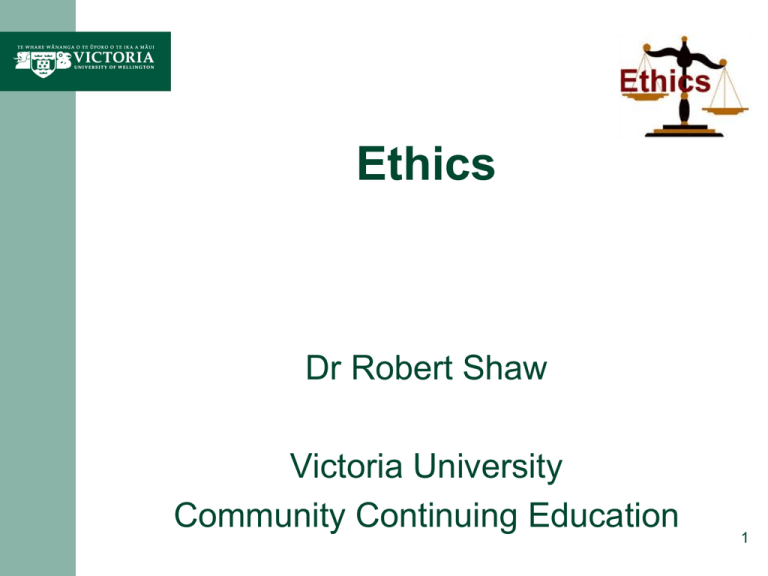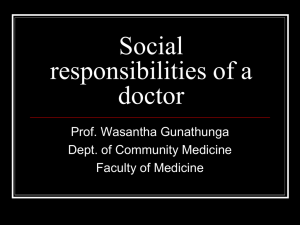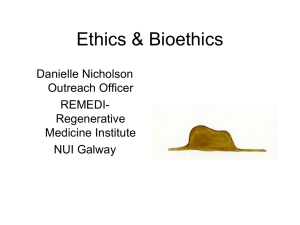ppt
advertisement

Ethics Dr Robert Shaw Victoria University Community Continuing Education 1 Descriptor This course presents traditional and modern theories of ethics. It invites you to consider their relevance to everyday living and issues such as climate change, criminal justice and business practice. 2 Descriptor Two-thousand-five-hundred years of Western philosophy in six hours. 3 Today Part 1 : Part 2 : Part 3 : Ethics as usual Traditional Modern The death of God & the meaning of Life Kant Nietzsche Western metaphysics Heidegger 4 Part 1 Ethics as usual Ethics courses Find dilemmas Approaches Important people The big three (normative ethics) Virtue ethics Utilitarianism Deontology 5 Part 1 Ethics as usual Ethics courses Find dilemmas Approaches Important people The big three (normative ethics) Virtue ethics Utilitarianism Deontology Big topics Children Medical questions Rights Government’s priorities The just war Corporate social responsibility 6 Part 1 Ethics as usual Normative ethics How one ought to act The drivers Virtue ethics – moral character Utilitarianism – outcomes (consequentialism) Deontology – rules 7 Part 1 Ethics as usual Normative ethics How one ought to act The drivers Virtue ethics – moral character Utilitarianism – outcomes (consequentialism) Deontology – rules 8 Part 1 Ethics as usual Ethics courses Find dilemmas Approaches Important people 9 Immanuel Kant was a real pissant Who was very rarely stable Heidegger, Heidegger was a boozy beggar Who could think you under the table David Hume could out consume Schopenhauer and Hegel And Wittgenstein was a beery swine Who was just as schloshed as Schlegel There's nothing Nietzsche couldn't teach ya 'Bout the raising of the wrist Socrates, himself, was permanently pissed John Stuart Mill, of his own free will On half a pint of shandy was particularly ill Plato they say, could stick it away Half a crate of whiskey every day Aristotle, Aristotle was a bugger for the bottle Hobbes was fond of his dram And René Descartes was a drunken fart "I drink, therefore I am" Yes, Socrates, himself, is particularly missed A lovely little thinker But a bugger when he's pissed 10 Part 1 Ethics as usual Classical theories What is the good life for us? How should people act? The path well trod Modern theories Philosophical analysis Commitment / preparation Classification Basic enquiries 11 Part 1 Classical theories What is the right thing to do? 12 Part 1 Classical theories What is the right thing to do? 13 Part 1 Classical theorists Plato – Idealists Aristotle - Happiness Epicurus - Hedonists Sceptics Cynics Stoics Christian ethics Spinoza Bentham Mill - Utilitarianism Kant - Deontology 14 School of Athens Raphael, Sistine Chapel, 1511 15 School of Athens Raphael, Sistine Chapel, 1511 1-Plato, 2-Aristotle, 3-Socrates, 4-Xenophon, 5-Æschines, 6-Alcibiades, 7-Zeno, 8-Epicurus, 9-Federico Gonzaga, 10-Averroes, 11-Pyhthagoras, 12-Francesco, 13-Heraclietus, 14-Diogenes, 15-Archimedes, 16 -Zoroaster, 17-Ptolemy, 18 Raphael. 16 Plato & Aristotle Classical theories What is the good life for us? How should people act? What are they? Plato – idealist, mathematics, innate Aristotle – moderation, virtues 17 Aristotle Ethics is practical No set way, use reason, good habits Doctrine of the mean – nature & desirable Virtue ethics Happiness: activity of a soul in accord with perfect virtue 18 Virtue ethics 19 Epicurus Hedonism 342-270 BC School of philosophy, Athens, 306 BC Everything we know comes from the senses Goal of life: body free from pain mind free from worry & fear Free will Democritus is right about atoms Philosophical hedonism Psychological hedonism 20 Skeptics Consolation theorists Questioning attitude Impossible to know Peace comes when you admit ignorance Positive aspects 21 Cynics “Dog like” Indifference to their way of life Shameless On guard Friend & foe Asceticism “I’m no one’s mug” Self-reliance 22 Diogenes (the dog) Jean-Léon Gérôme (1824-1904) 23 Stoics Zeno of Elea, 333 – 264 BC Replaced Cynics Stoa = porch Paradoxes (the arrow) Power of rationality “ Man conquers the world by conquering himself. 24 Influenced: Romans & Christians Zeno 25 Christian ethics Decalogue Source of authority An example of virtue ethics Consolation 26 Spinoza 1632-1677 Portuguese Dutch Jew, Spain Lens grinder, dust killed him Moral character - injustice Age 23 excommunicated 27 Spinoza The Lords of the ma’amad, having long known of the evil opinions and acts of Baruch de Spinoza, have endeavord by various means and promises, to turn him from his evil ways. But having failed to make him mend his wicked ways, and, on the contrary, daily receiving more and more serious information about the abominable heresies which he practiced and taught and about his monstrous deeds, and having for this numerous trustworthy witnesses who have deposed and born witness to this effect in the presence of the said Espinoza, they became convinced of the truth of the matter; and after all of this has been investigated in the presence of the honorable chachamin, they have decided, with their consent, that the said Espinoza should be excommunicated and expelled from the people of Israel. By the decree of the angels, and by the command of the holy men, we excommunicate, expel, curse and damn Baruch de Espinoza, with the consent of God, Blessed be He, and with the consent of all the Holy Congregation, in front of these holy Scrolls with the six-hundred-and thirteen precepts which are written therein, with the excommunication with which Joshua banned Jericho, with the curse with which Elisha cursed the boys, and with all the curses which are written in the Book of the Law. Cursed be he by day and cursed be he by night; cursed be he when he lies down, and cursed be he when he rises up; cursed be he when he goes out, and cursed be he when he comes in. The Lord will not spare him; the anger and wrath of the Lord will rage against this man, and bring upon him all the curses which are written in this book, and the Lord will blot out his name from under heaven, and the Lord will separate him to his injury from all the tribes of Israel with all the curses of the covenant, which are written in the Book of the Law. But you who cleave unto the Lord God are all alive this day. We order that no one should communicate with him orally or in writing, or show him any favor, or stay with him under the same roof, or within four ells of him, or read anything composed or written by him. 28 Deontology Duty ethics Like virtue ethics Rights theory Kant 29 Deontology deon = obligation, duty Like virtue ethics – rules C D Broad Deontological c/f teleological (consequence) Kant – the transition person 30 Utilitarianism: Bentham Aristotle – happiness Bentham 1748-1832 Auto-Icon English social reformer Animal rights Economic freedom Separation of church & state University College London 31 Utilitarianism: Bentham Principle of utility (from Hume) Only consequences count Greatest good for the greatest number Objective measures Public discussion Pain & pleasure Natural rights Animal rights Concern for the poor 32 Utilitarianism: Mill James Mill John Stuart Mill 1806-1873 Consequences Cost-benefit analysis The morality of Government “Evidence based” 33 Part 1 Ethics as usual Classical theories What is the good life for us? How should people act? 34 Part 1 Ethics as usual Classical theories What is the good life for us? How should people act? 35 Ethics as usual Classical theories (now complete) What is the good life for us? How should people act? Modern theories Philosophical analysis Commitment Preparation for real-world ethics Basic enquiries ......... 36 Part 1 Ethics as usual Basic enquiries of modern ethics Language Objectivity & subjectivity Free will & determinism Naturalism, non-naturalism Emotivism 37 Language Frege Russell Wittgenstein Ayre, age 26 38 Part 2 The death of God & the meaning of Life Continental tradition Kant Nietzsche Heidegger (Part 3) 39 Part 2 The death of God & the meaning of Life Part I Before the death of God 7 1 PLATO 2 KANT AND CHRISTIANITY 3 SCHOPENHAUER 4 EARLY NIETZSCHE 5 HEGEL 6 HEGEL 9 21 29 44 57 71 Part II After the death of God 81 7 LATER NIETZSCHE 8 POSTHUMOUS NIETZSCHE 9 EARLY HEIDEGGER 10 SARTRE 11 SARTRE 12 CAMUS 13 FOUCAULT 14 DERRIDA 15 LATER HEIDEGGER 83 97 107 125 142 160 73 88 197 40 41 Kant Kant himself Integration of Metaphysics Ethics Aesthetics Education 42 43 Kant Two things fill the mind with ever new and increasing admiration and awe, the more often and perseveringly my thinking engages itself with them: the starry heavens above me and the moral law within me. 44 45 46 47 48 Kant Metaphysics Ethics Aesthetics (judgement) Youtube version (attack ad) 49 Kant metaphysics 50 Kant metaphysics 51 Kant metaphysics 52 Kant metaphysics Philosophy of mind Consciousness The chair Youtube Kant’s song 53 Kant’s deontology 1. Find the rational principle that would stand as a categorical imperative grounding all other ethical judgments. (c/f hypothetical or conditional) 2. Always act in such a way that you can also will that the maxim of your action should become a universal law. 3. Act so that you treat humanity, both in your own person and in that of another, always as an end and never merely as a means. 4. Deontological = duty based 5. Human rights are inviolable. 54 55 Kant’s deontology 56 Kant: Ethics (education) Nation – Culture – Student Depth Today’s teachers & students 57 Nietzsche 58 Nietzsche The person Metaphysics Ethics God Women Eternal return 59 Aphorism 60 Nietzsche: The death of God YouTube version L dramatic R explanatory 61 Nietzsche’s ethics Eternal return / recurrence 62 Nietzsche’s ethics You are going to women? Then don’t forget the whip. 63 Part 3 Western metaphysics The essence of humankind Modernity Heidegger Truth Technology Epoch 64 Martin Heidegger 65 Model of human-ness Ontological “structure” Understanding Disposition Nomination Ontological kinetic For-the-sake-of-which cascades Way of being-in-the-world: past-present-future equiprimordial (care structure) 66 What is truth? Heidegger : Two notions Correspondence Disclosure 67 Truth mediates metaphysics 68 Appendix: Kant Song 69 Kant song 1 Let us first divide cognition into rational analysis and sensory perception (which Descartes considered valueless). Now reason gives us concepts which are true but tautological; sensation gives us images whose content is phenomenal. Whatever greets our senses must exist in space and time for else it would be nowhere and nowhen and therefore slime; the space and time we presuppose before we sense reality must have innate subjective transcendental ideality. Thus space and time are forms of our perception whereby sensation’s synthesized in orderly array; the same must hold for rational conception: 70 in everything we think, the laws of logic must hold sway. Kant song 2 But a problem here arises with respect to natural science: while empirical in method, on pure thought it lays reliance. Although for Newton’s findings we to Newton give the glory Newton never could have found them if they weren’t known a priori. We know that nature governed is by principles immutable but how we come to know this is inherently inscrutable; that thought requires logic is a standpoint unassailable 71 but for objects of our senses explanations aren’t available. Kant song 3 So let's attempt to vivisect cognition by critical analysis in hope that we may find the link between pure thought and intuition: a deduction transcendental will shed light upon the mind. You may recall that space and time are forms of apprehension and therefore what we sense has spatiotemporal extension; 72 whatever is extended is composed of a plurality but through an act of synthesis we form a commonality. Kant song 4 If we are to be conscious of a single concrete entity each part of its extension must be given independently combining in a transcendental apperceptive unity to which I may ascribe the term “self-conscious” with impunity. The order of our various sensations arises from connections not beheld in sense alone; our self creates the rules of their relations and of this combination it is conscious as its own. 73 Kant song 5 While these rules correspond to scientific causal laws the question of their constancy remains to give us pause; but once we recollect the source of our self-conscious mind, to this perverse dilemma a solution we may find. The self is nothing but its act of synthesis sublime; this act must be the same to be self-conscious over time. The rules for combination of its selfhood form the ground 74 so what we perceive tomorrow by today’s laws must be bound. Kant song 6 These constant laws whereby we shape experience are simply those which regulate our reason: that is plain. So don’t ask why the stars display invariance -the Cosmos is produced by your disoriented brain! 75








